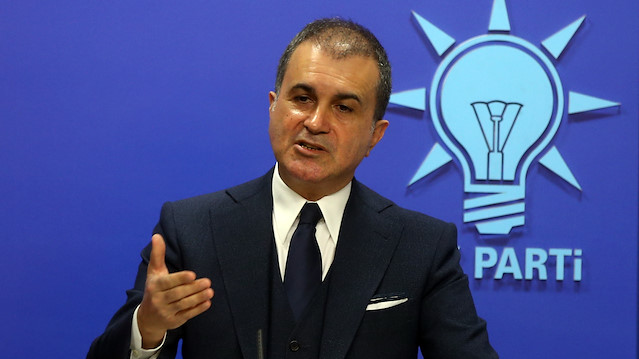
Turkey wants to know whereabouts of Khashoggi’s body, says ruling AK party's spokesman
Turkey wants to know the whereabouts of slain Saudi journalist Jamal Khashoggi’s body, the country’s ruling party said on Wednesday.
Khashoggi went missing after entering the Saudi Consulate in Istanbul on Oct. 2.
After initially saying Khashoggi had left the consulate alive, the Saudi administration admitted weeks later he had died there.
"We want to know where the body [of Khashoggi] is, we want that our authorities receive information about who the local collaborators are", Ömer Çelik, spokesman for the Justice and Development (AK) Party, said at a news conference in Ankara.
Speaking about the probe into the murder of Khashoggi, Çelik said it was "not an action to be performed without instructions from a higher level".
"Turkey does not blame anyone in advance, but won't allow cover up of anything," he added.
Investigation of the incident suggests a special hit squad came to the consulate to kill Kashoggi and cover up the murder.
Meanwhile, Turkish President Recep Tayyip Erdogan stressed that all details of the case should be revealed, including who gave the instruction for the "premeditated murder".
U.S. President Donald Trump said he could impose sanctions on Saudi Arabia, but also signaled that he did not want to harm bilateral relations.
Telephoning Erdogan, Saudi King Salman bin Abdulaziz and Crown Prince Mohammad bin Salman promised necessary cooperation.
The chief prosecutor's office in Riyadh also announced that the murder was planned.
Çelik said Turkish army is protecting the drilling ship "Fatih" in the Mediterranean and suggested Greece and Greek Cypriot administration to abstain from any attempt against it.
Noting Turkey's gas exploration in the Eastern Mediterranean is being carried out on legal ground, he added: "The block 7 is in Turkey’s continental shelf."
The block 7 is one of the blocks located in the unilaterally declared exclusive economic zone by the Greek Cypriot Administration and it wants to invite foreign energy firms for natural gas exploration.
Çelik said any attempt from Greece to gradually widen its territorial waters will be “strongly” responded by Turkey.
Cyprus has been divided since 1974, when a Greek Cypriot coup was followed by violence against the island's Turks and Ankara's intervention as a guarantor power.
It has seen an on-and-off peace process in recent years, including the latest initiative in Switzerland under the auspices of guarantor countries Turkey, Greece and the U.K. collapsing in 2017.
Turkey blames Greek Cypriot intransigence for the talks' failure, also faulting the European Union for admitting Cyprus as a divided island into the union in 2004 after Greek Cypriot voters rejected a peace deal.











